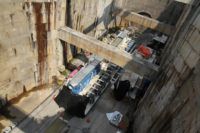Thousands of tonnes of allegedly faulty structural steel lie unwanted in a Dutch port following last year’s cancellation of a major bridge contract in Leverkusen, Germany. The German federal highway authority has now appointed a new team to complete the first of twin cable-stayed bridges to replace an old crossing carrying the A1 Dortmund/Koblenz motorway over the Rhine River next to the city.
Under the new $262-million contract, a Franco-German joint venture will build the first of parallel bridges next to the existing cable-stayed crossing. After the new bridge opens, the authority, Autobahn GmbH (AGmbH) plans to demolish the old crossing and have the second bridge twin built in its place.
AGmbH has set a late 2023 completion deadline for the new team led by Hochtief A.G. and Max Bögl Group. Also in the joint venture are France’s Eiffage Métal S.A. and its affiliates Iemants N.V. and SEH Engineering GmbH.
Under the original contract with PORR Deutschland GmbH, signed in 2017, the first bridge should have opened late last year with its twin on course for completion by 2024.
PORR’s $436-million contract included removing the old crossing and carrying out substantial upgrades to approach roads. But the main focus was the pair of new bridges, conceptually designed by Ingenieurbüro Grassl GmbH.
Support by Cables from A-frame Pylons
Stretching 688.7 meters between abutments, both bridges will consist of 280-m-long, 33.7-m-wide central main spans supported by cables from A-frame pylons on either side, which rise 56.6 m above their decks.
The main-span decks will comprise roughly 6-m-wide x 3.8-m-deep steel box girders along the edges supporting steel cross beams. Each bridge will contain roughly 16,000 tonnes of steel.
But with the pylon foundations and approach road piers completed, work stopped last year after months of discussion about the quality of steel fabricated in China.
“No agreement could be reached on how to deal with the large number of deficiencies,” stated Sascha Kaiser, director of state highway authority Straßen.NRW, last April. “This is forcing us to find a new partner to complete the bridge,” he added.
Straßen.NRW alleged “serious deficiencies in the processing of the steel components that neither meet the German standards nor the contractual agreements.” Attempts to remedy such faults would not achieve regulatory or contractual requirements, while reducing the bridge’s longevity and increasing maintenance needs, it claimed. The contract termination avoided “a long-term expert dispute that would disrupt the construction process,” it added.
PORR rejected the allegations. “The deficiencies in question are a common occurrence in high-volume steel construction. These faults include stress marks, scratches, residue from welding or individual pores or occlusions in the welded seams,” stated the contractor.
Production of the steel by China Railway Shanhaiguan Bridge Group Co. Ltd. had been supervised by TÜV Rheinland—Technical Inspection Association Rheinland—and owner representatives, added the company. TÜV Rheinland had confirmed that the defects could be rectified without need for “new production of all steel components,” according to PORR.
“PORR considers the termination to be without any merit,” says the contractor’s lawyer, Ralf Leinemann of Leinemann & Partner Rechtsanwälte mbB. The contractor has exercised its contractual right to arbitration appraisal by a state-approved inspection body.
Additionally, PORR will submit a final invoice for work done and sue the owner if payment is not made, adds Leinemann. AGmbH has already paid PORR approximately $105 million and is preparing a counterclaim for the extra costs it is incurring, says a spokesman for the authority.
Faulty Steel Lying Idle
While the new construction team inherits some of PORR’s equipment and facilities, most of the roughly 16,000 tonnes of steel under contention is lying idle in the Netherlands, and the rest remains in China, according to Leinemann. The steel’s fate is uncertain.
With work restarting, “we are optimistic about this important Rhine bridge,” says Thomas Ganz, the Rhineland director of AGmbH. The federal authority took over responsibility for all national highways from the states last month.
The new contract includes incentives for early completion, which can’t come soon enough for Leverkusen’s Mayor Uwe Richrath. Carrying the busy A1 highway in and out of the city, the 55-year-old bridge has been closed to heavy vehicles since structural faults were found eight years ago.
Progress on the new crossing was already delayed by the need to probe for unexploded World War II bombs and the discovery of asbestos on site. According to Richrath, last year’s contract cancellation was “a disaster.”







Post a comment to this article
Report Abusive Comment